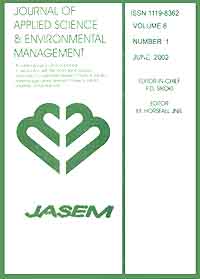
|
Journal of Applied Sciences and Environmental Management
World Bank assisted National Agricultural Research Project (NARP) - University of Port Harcourt
ISSN: 1119-8362
Vol. 15, No. 1, 2011, pp. 21 -24
|
 Bioline Code: ja11005
Bioline Code: ja11005
Full paper language: English
Document type: Research Article
Document available free of charge
|
|
|
Journal of Applied Sciences and Environmental Management, Vol. 15, No. 1, 2011, pp. 21 -24
| en |
Survey of Anti-biotic Usage and its Effects in Port Harcourt City in the Niger Delta of Nigeria
Shorinwa, O.A. & Eniojukan, J.F.
Abstract
The pattern of using antibiotics in community pharmacies in Portharcourt city was investigated with a view of measuring the existing practices in the consumer use of antibacterial drugs. This will serve as a guide to health policy makers to improve rational use of drugs. The parameters investigated are the pattern of sale of antibacterial drugs, pharmacist-patient communication at the point of sale, knowledge, attitude and practices of the consumers. The instruments for the research consisted of two sets of questionnaires. Ninety-five questionnaires were distributed to community pharmacists and three hundred and twenty questionnaires were distributed to consumers. The study showed that 36% of the respondents sold ampiclox and 50% sold other antibacterial drugs. 13% of the consumers frequently purchased antibacterial drugs while 80% of the respondents purchased the drugs occasionally. 63% of the consumers purchased sub-therapeutic dose of antibacterial drugs while the remaining 37% purchased standard therapeutic dose. 73% of the respondents did not indicate their reasons for not accepting the counseling. Meanwhile 8% refused counseling as a result of their habits and 3% due to ignorance. The results showed common trend of occasional purchase of optimal dosage of antibacterial drugs. Furthermore, 64% of the consumers got to know about antibacterial drugs through prescriptions and 82% of the consumers are aware that inappropriate use of antibacterial drugs can lead to the development of resistance. Drug use is the end of therapeutic consultation. Improving drug use enhances the quality and lowers cost of healthcare.
|
| |
© Copyright 2011 - Journal of Applied Sciences & Environmental Management
|
|
